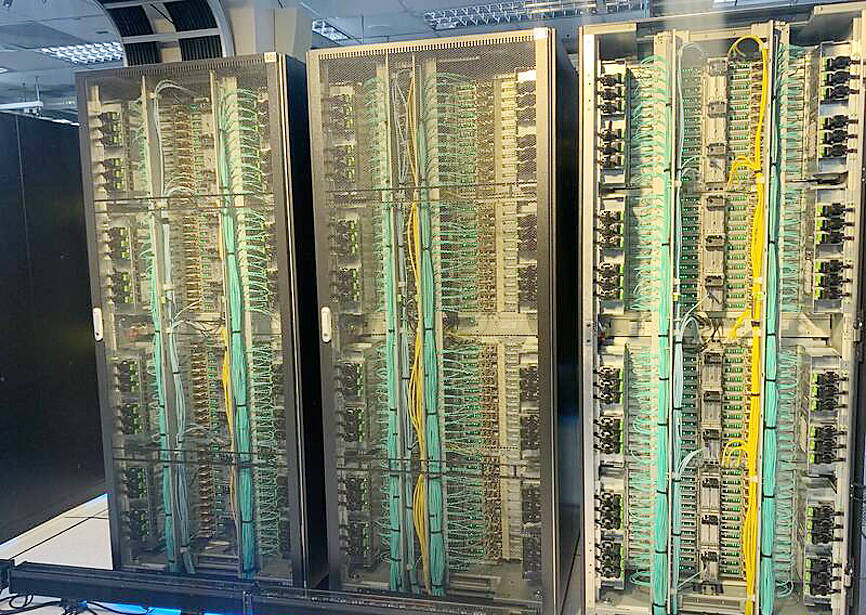The Executive Yuan has approved the Central Weather Administration’s (CWA) plan to upgrade a weather observation station in Hsinchu County into the Hsinchu Meteorology Science Park, which would include a server room for a supercomputer to facilitate the use of artificial intelligence (AI) for weather forecasting.
The use of AI could enable the meteorology agency to provide more precise weather forecasts and develop more weather-related applications, but the CWA currently does not have sufficient computing power to run a supercomputer or the space to build a server room for it, CWA Administrator Lu Kuo-cheng (呂國臣) said.
A supercomputer server room must be able to carry 2 tonnes per square meter, Lu said.

Photo: Taipei Times
The CWA would build the supercomputer in Hsinchu, because the county has high-quality and high-speed Internet, he said.
Data, computing power and talent are three main elements that the CWA would need to be able to use AI in weather forecasting, he said.
“We have weather data accumulated over the past 100 years, but we need computing power to train large-scale weather forecast models and integrate them with existing models. We are working with the National Science and Technology Council and Nvidia Corp to learn new ways to develop high-resolution forecast models using AI,” he said.
The plan, which is named “Construction Project of High-Speed Computer for Weather Forecast,” has been approved by the Executive Yuan, with construction scheduled to be completed in 2027, Lu said.
The use of AI would increase the accuracy of global weather forecast models by 6 percent and projected paths for typhoons within 120 hours by 12 percent, Lu said.
The percentage of data processed through graphic processing units would gradually expand from 30 percent to 40 percent and 60 percent, CWA Remote Sensing Division deputy director Chang Bau-liang (張保亮) said.
The training time would be 1,000 to 1,500 times faster if the CWA uses AI to train computers to deep-learn atmospheric models, Chang said, adding that weather forecast results could be obtained within a few minutes.
Separately, the CWA said it would offer wind force forecasts for coastal areas this summer when briefing mayors and county commissioners about potential typhoons.
The administration said it would also bolster the monitoring of high-intensity short duration rainfall by installing weather radar systems in Yunlin and Yilan counties.

‘FORM OF PROTEST’: The German Institute Taipei said it was ‘shocked’ to see Nazi symbolism used in connection with political aims as it condemned the incident Sung Chien-liang (宋建樑), who led efforts to recall Democratic Progressive Party (DPP) Legislator Lee Kun-cheng (李坤城), was released on bail of NT$80,000 yesterday amid an outcry over a Nazi armband he wore to questioning the night before. Sung arrived at the New Taipei City District Prosecutors’ Office for questioning in a recall petition forgery case on Tuesday night wearing a red armband bearing a swastika, carrying a copy of Adolf Hitler’s Mein Kampf and giving a Nazi salute. Sung left the building at 1:15am without the armband and apparently covering the book with a coat. This is a serious international scandal and Chinese

PERSONAL DATA: The implicated KMT members allegedly compiled their petitions by copying names from party lists without the consent of the people concerned Judicial authorities searched six locations yesterday and questioned six people, including one elderly Chinese Nationalist Party (KMT) member and five KMT Youth League associates, about alleged signature forgery and fraud relating to their recall efforts against two Democratic Progressive Party (DPP) legislators. After launching a probe into alleged signature forgery and related fraud in the KMT’s recall effort, prosecutors received a number of complaints, including about one petition that had 1,748 signatures of voters whose family members said they had already passed away, and also voters who said they did not approve the use of their name, Taipei Deputy Chief Prosecutor

UNDER ATTACK: Raymond Greene said there were 412 billion malicious threats in the Asia-Pacific region in the first half of 2023, with 55 percent targeting Taiwan Taiwan not only faces military intimidation from China, but is also on the front line of global cybersecurity threats, and it is taking action to counter those attacks, President William Lai (賴清德) said yesterday. Speaking at the opening of this year’s Cybersec Expo in Taipei, the president assured foreign diplomats and exhibitors that Taiwan remained committed to strengthening its defense against cyberattacks and enhancing the resilience of its digital infrastructure. Lai referenced a report from the National Security Bureau (NSB) indicating that the Government Service Network faced an average of 2.4 million intrusion attempts daily last year, more than double the figure

Retired US general Robert B. Abrams reportedly served as adviser to Chief of the General Staff Admiral Mei Chia-shu (梅家樹) during the Ministry of National Defense’s computer-simulated war games in the buildup to this year’s 41st annual Han Kuang military exercises, local media reported yesterday. For 14 days and 13 nights starting on April 5 and ending yesterday, the armed forces conducted the computer-simulated war games component of the Han Kuang exercises, utilizing the joint theater-level simulation system (JTLS). Using the JTLS, the exercise simulated a continuous 24-hour confrontation based on scenarios such as “gray zone” incursions and the Chinese People’s Liberation